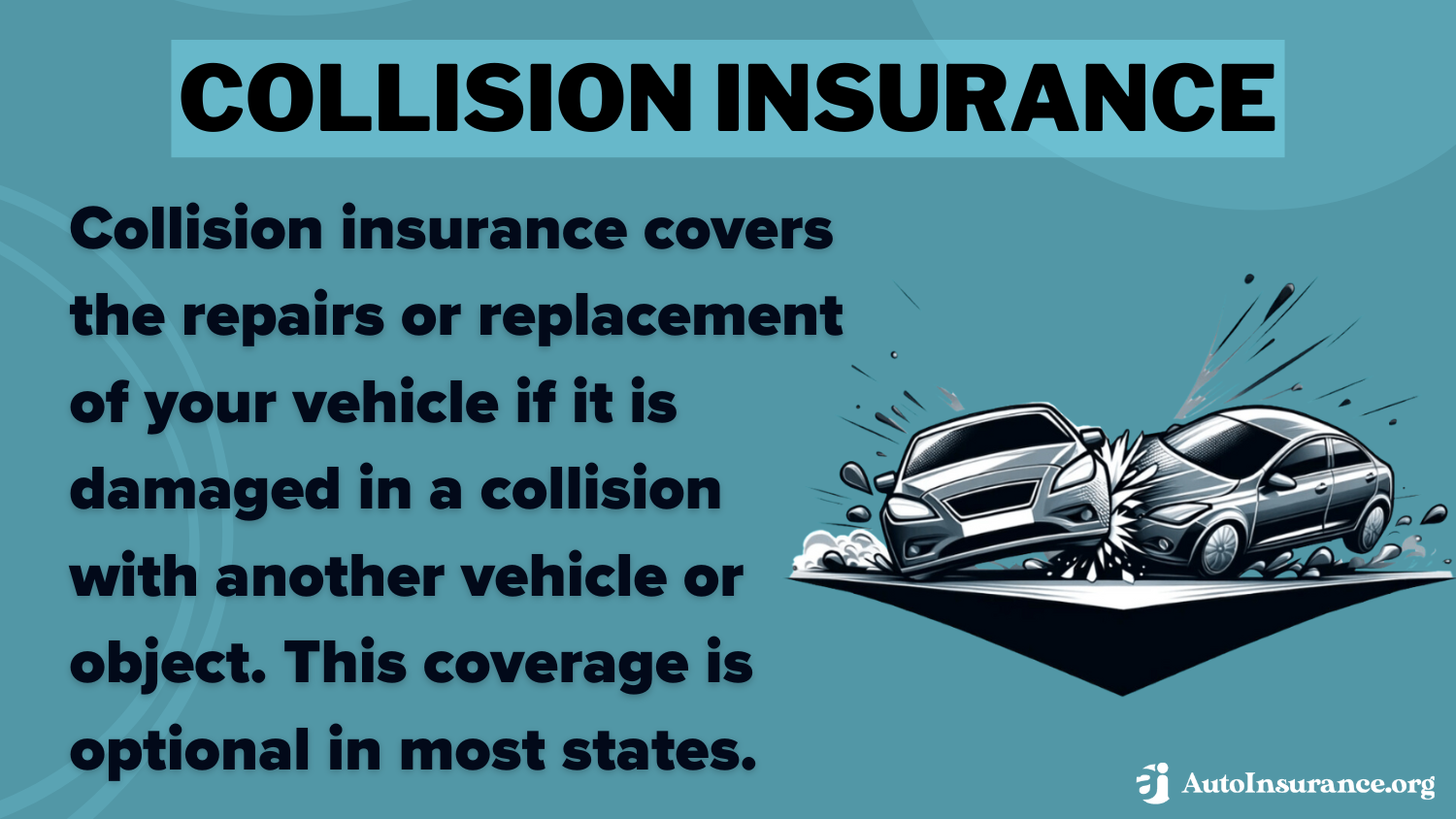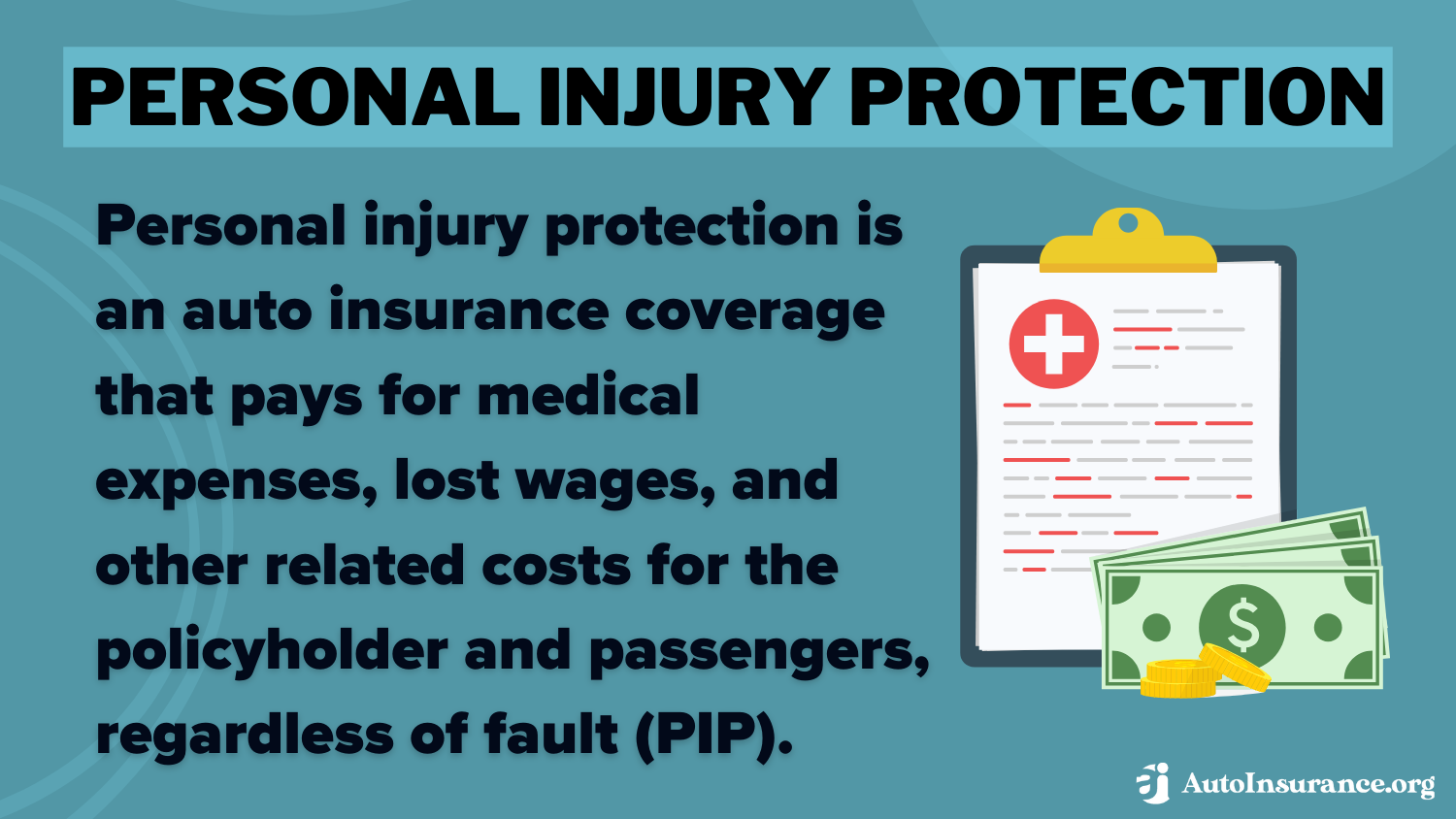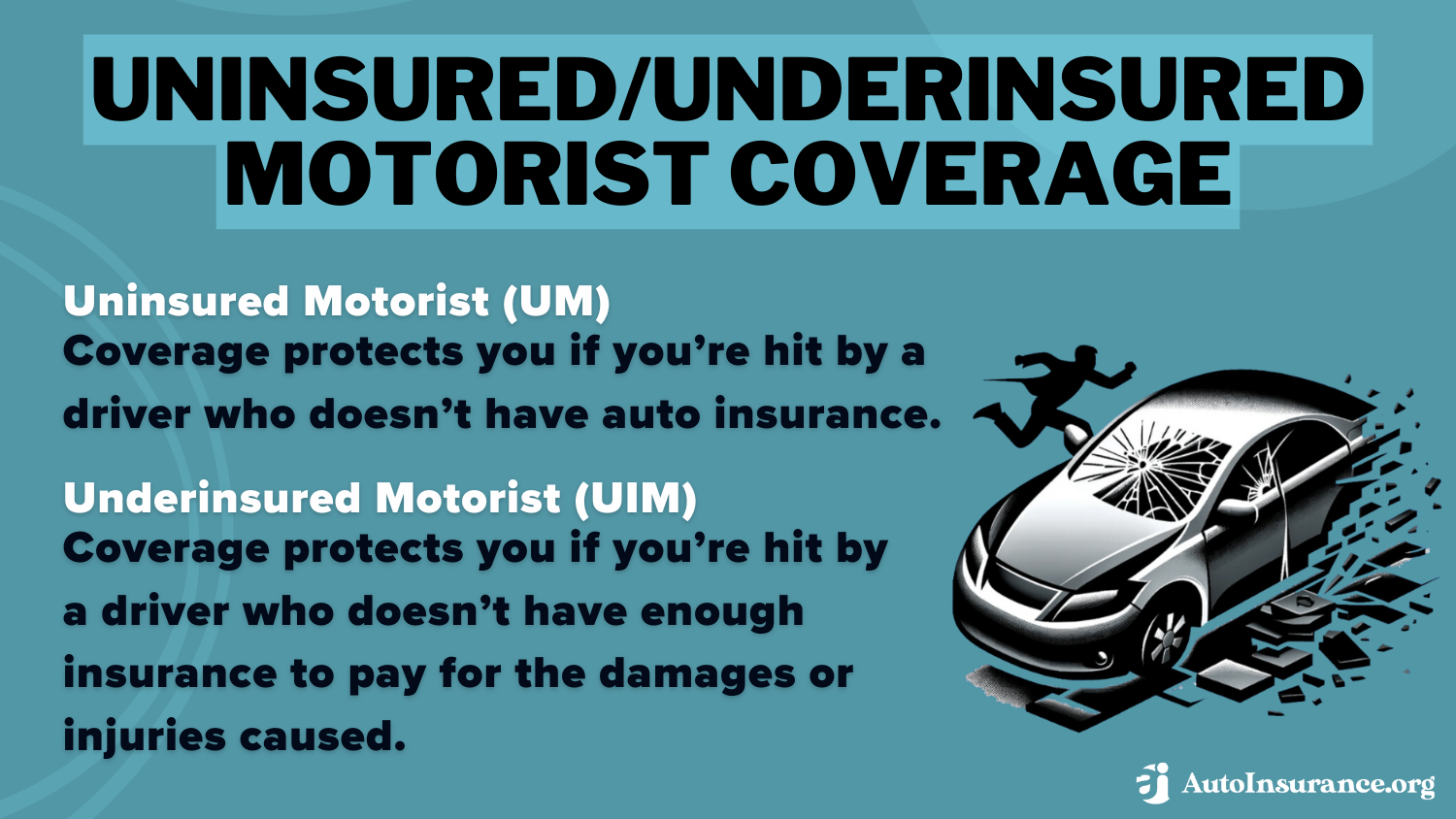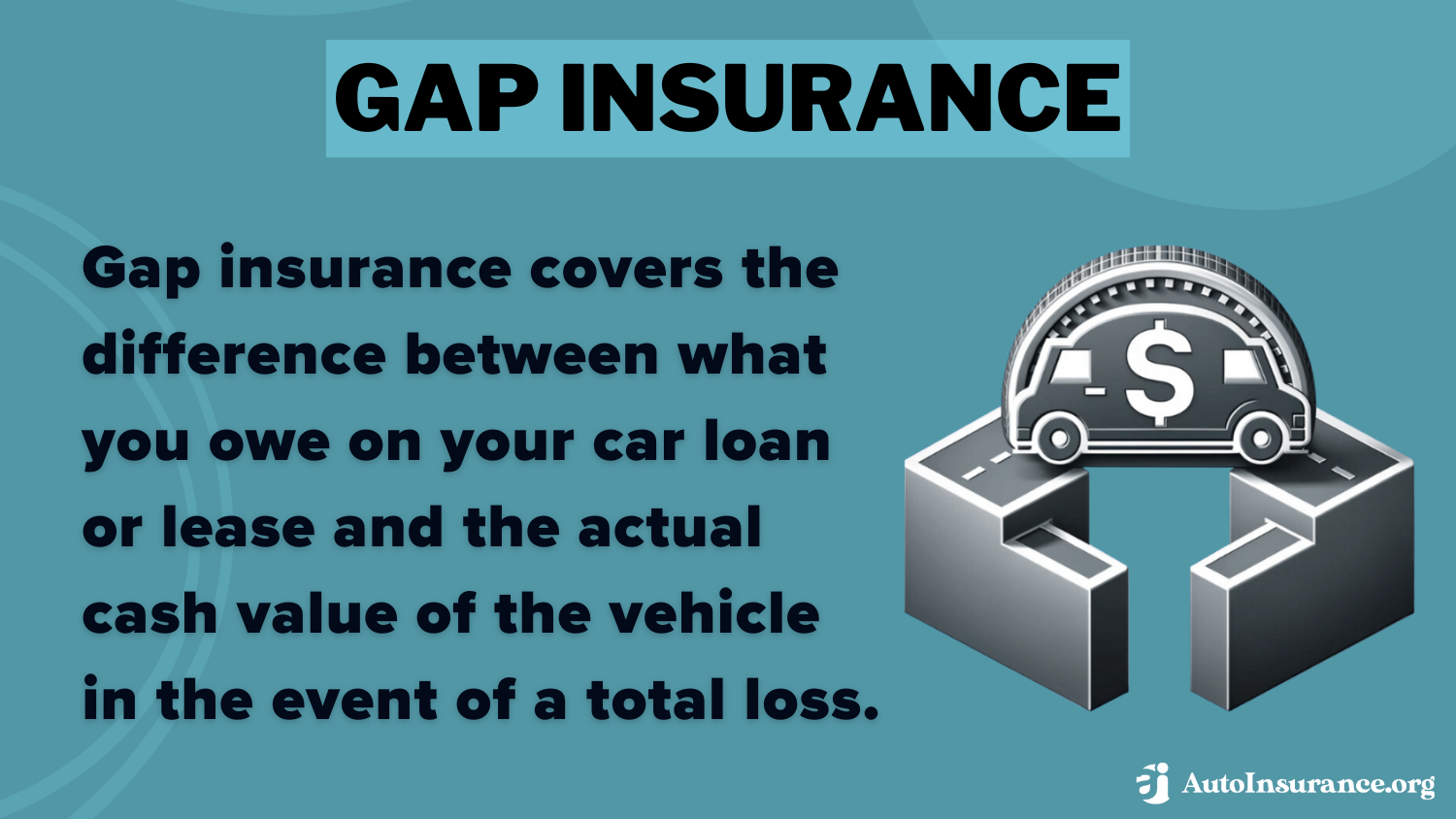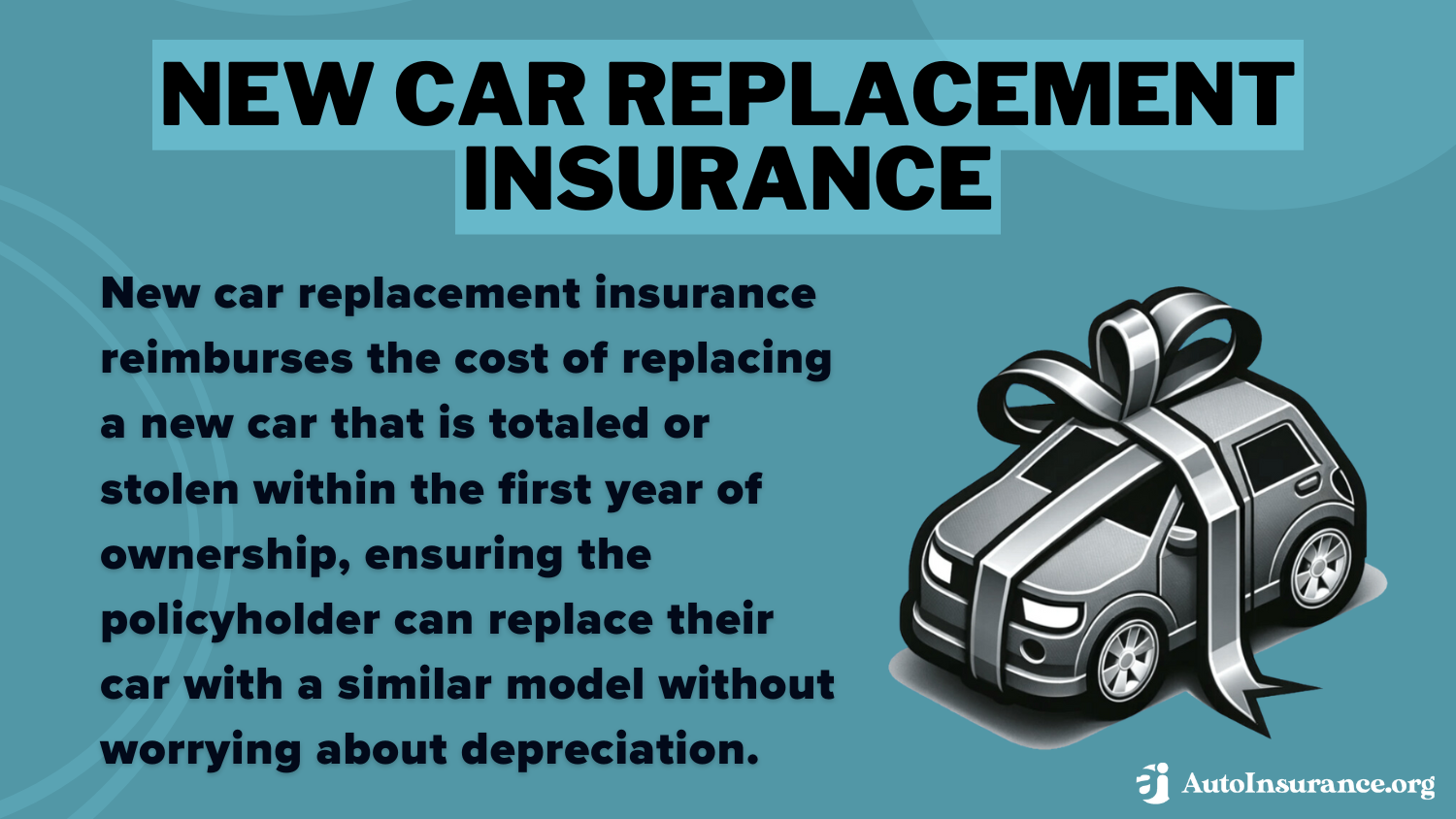Types of Auto Insurance in 2025 (Coverage Options Explained)
Most states require liability insurance, though you may need other types of auto insurance. For example, drivers with auto loans must carry full coverage, starting from $80/mo, though rates vary by the different types of car insurance companies. We'll go over a list of auto insurance coverages explained below.
Free Car Insurance Comparison
Compare Quotes From Top Companies and Save
Secured with SHA-256 Encryption
Brad Larson
Licensed Insurance Agent
Brad Larson has been in the insurance industry for over 16 years. He specializes in helping clients navigate the claims process, with a particular emphasis on coverage analysis. He received his bachelor’s degree from the University of Utah in Political Science. He also holds an Associate in Claims (AIC) and Associate in General Insurance (AINS) designations, as well as a Utah Property and Casual...
UPDATED: Apr 23, 2025
It’s all about you. We want to help you make the right coverage choices.
Advertiser Disclosure: We strive to help you make confident auto insurance decisions. Comparison shopping should be easy. We are not affiliated with any one auto insurance provider and cannot guarantee quotes from any single provider. Our partnerships don’t influence our content. Our opinions are our own. To compare quotes from many different companies please enter your ZIP code on this page to use the free quote tool. The more quotes you compare, the more chances to save.
Editorial Guidelines: We are a free online resource for anyone interested in learning more about auto insurance. Our goal is to be an objective, third-party resource for everything auto insurance related. We update our site regularly, and all content is reviewed by auto insurance experts.
UPDATED: Apr 23, 2025
It’s all about you. We want to help you make the right coverage choices.
Advertiser Disclosure: We strive to help you make confident auto insurance decisions. Comparison shopping should be easy. We are not affiliated with any one auto insurance provider and cannot guarantee quotes from any single provider. Our partnerships don’t influence our content. Our opinions are our own. To compare quotes from many different companies please enter your ZIP code on this page to use the free quote tool. The more quotes you compare, the more chances to save.
On This Page
When purchasing a car insurance policy, picking and choosing the types of auto insurance coverage you need from the best auto insurance companies can be overwhelming. Not having enough coverage can result in high out-of-pocket costs, while having unnecessary auto insurance coverage types means paying higher rates.
While states require drivers to carry some coverages, others, such as full coverage auto insurance, are optional, and the states leave it up to drivers whether they want extra coverage. Since each coverage protects against different things, drivers should read up on each before deciding.
- Types of Auto Insurance
- What are SR-22 and FR-44 insurance in Virginia?
- New Car Replacement Insurance in 2025 (In-Depth Explanation)
- What are SR-22 and FR-44 insurance in Florida?
- Non-Owner SR-22 Auto Insurance in 2025 (Coverage Explained)
- Cheap No-Fault Auto Insurance in 2025 (10 Most Affordable Companies)
- Collision Auto Insurance in 2025 (What Every Driver Should Know)
- Comprehensive Auto Insurance Defined in 2025 (Everything You Need to Know)
- Pleasure-Use vs. Commuter Auto Insurance in 2025 (Compare Rates & Discounts)
- 8 Best Pay-As-You-Go Auto Insurance Companies in 2025 (See Our Top Picks)
- Progressive SR-22 Insurance Review (2025)
- Cheap Broad Form Insurance in 2025 (Top 10 Low-Cost Companies)
- FR-44 Auto Insurance in 2025 (Get the Facts)
- Mechanical Breakdown Insurance (MBI) in 2025 (Coverage Explained)
- Personal Injury Protection (PIP) Auto Insurance in 2025 (What it Means for Your Coverage)
- Bodily Injury Liability (BIL) Auto Insurance Defined in 2025 (Coverage Breakdown)
- Guaranteed Auto Protection (Gap) Insurance in 2025 (Coverage Explained)
- Cheap Usage-Based Auto Insurance in 2025
- 10 Best Auto Insurance Companies for Cheap Personal Injury Protection (PIP) in 2025
- SR-22 Auto Insurance in 2025 (Coverage Explained)
- SR-50 Auto Insurance in 2025 (Coverage Explained)
- Cheap Temporary Auto Insurance in 2025 (Top 10 Low-Cost Companies)
- Best Business Auto Insurance in 2025 (Check Out the Top 10 Providers)
- Best Joint Ownership Auto Insurance in 2025 (Find the Top 10 Companies Here!)
- Best Delivery Driver Auto Insurance in 2025 (Find the Top 10 Companies Here!)
- Best Co-Op Auto Insurance in 2025 (Your Guide to the Top 10 Companies)
- Best Auto Insurance for Leased Business Vehicles in 2025 (Top 10 Companies)
- Best Yearly Premium Auto Insurance in 2025 (Our Top 10 Picks)
- Best Classic Car Insurance Without a Garage in 2025 (Your Guide to the Top 10 Companies)
- Cheap 6-Month Auto Insurance in 2025 (Save Big With These 8 Companies!)
- Full Coverage Auto Insurance in 2025 (What All Drivers Should Know!)
- Cheap Assigned Risk Pool Auto Insurance in 2025 (Top 10 Low-Cost Companies)
- Cheapest Liability-Only Auto Insurance in 2025 (Save With These 9 Companies!)
- Collision vs. Comprehensive Auto Insurance Explained in 2025 (Key Points Outlined)
- Best Commercial General Liability Insurance in 2025 (Top 10 Companies Ranked)
Find cheap auto insurance no matter what type of coverage you need by entering your ZIP code into our comparison tool today.
- Drivers must carry their state’s required minimum amount of liability insurance
- Drivers with car loans or leases need collision and comprehensive coverage
- Most insurance companies offer multiple add-on coverages for customers
Most Common Types of Auto Insurance Coverage Explained
Auto insurance protects drivers by paying the bills for accidents so drivers don’t end up in debt. Car insurance rates vary from state to state and company to company. On top of that, your car insurance rate can be affected by factors like age, driving history, and even your credit rating.
Every insurance company differs in what coverages they offer. Still, most auto insurance companies will offer the following types of car insurance coverage because either states or lenders require them.
Liability Auto Insurance
Liability auto insurance is an important insurance coverage for drivers and one of the most affordable types of auto insurance. The two types of car insurance coverages within liability insurance include bodily injury liability and property damage liability.
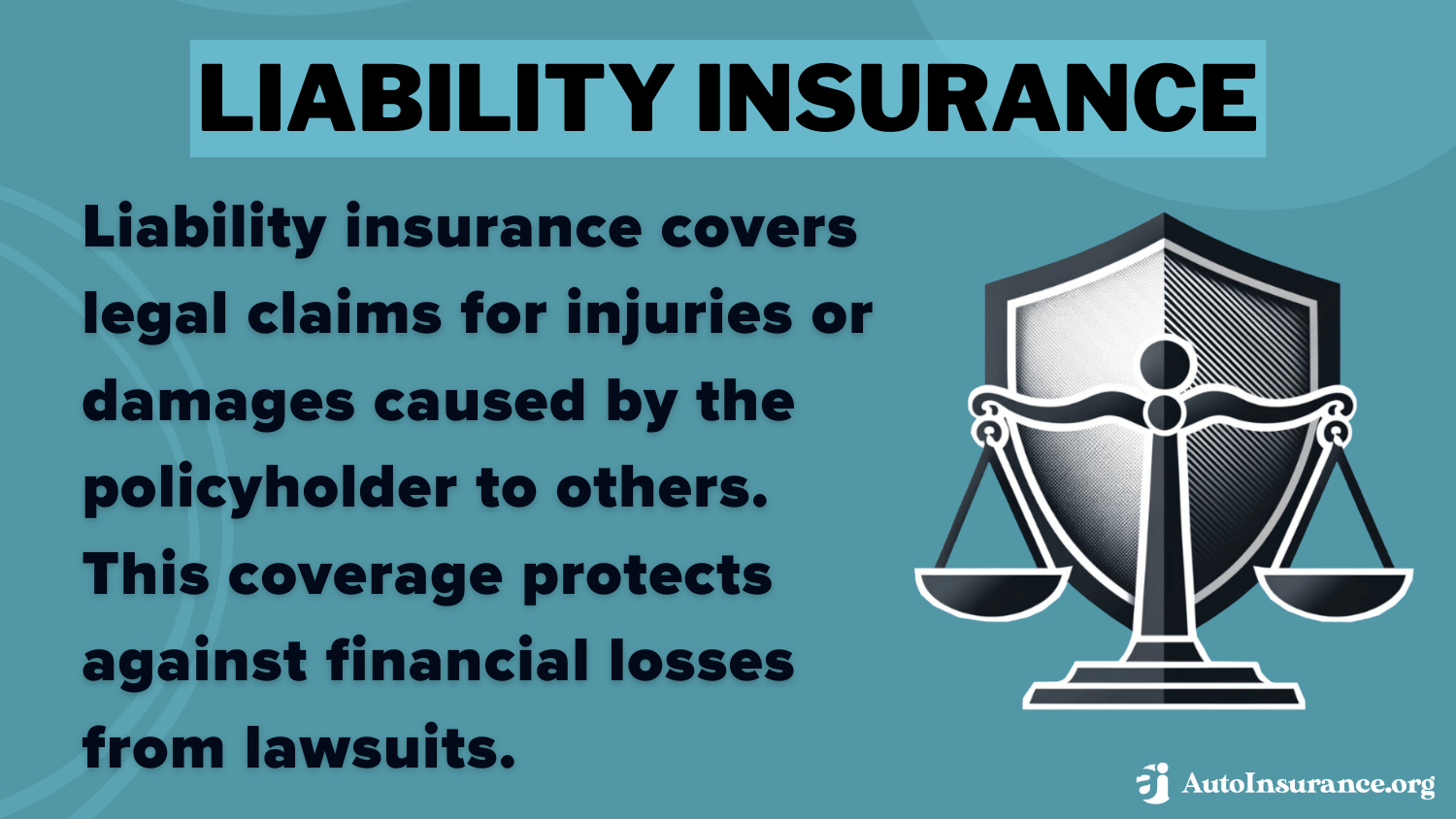
If you cause an at-fault accident, property damage liability insurance pays for the other parties’ damages. On the other hand, bodily injury liability auto insurance pays if the other driver or passengers are injured, and property damage liability pays for the other driver’s vehicle repairs or property damages, such as a broken mailbox.
Keep in mind that there are no liability auto insurance types that cover your accident costs. Almost every state requires drivers to carry this insurance so other parties’ costs get paid if a driver causes an accident.
Read More: Cheapest Liability-Only Auto Insurance
Liability insurance is the most basic legal requirement for insurance coverage. Opting for full coverage is advisable to enhance your protection, albeit it comes with higher costs. Take a look at the chart below to see the average rates for full coverage auto insurance in your state:
Full Coverage Auto Insurance Monthly Rates by State
| State | Rates |
|---|---|
| Alabama | $105 |
| Alaska | $103 |
| Arizona | $112 |
| Arkansas | $116 |
| California | $140 |
| Colorado | $115 |
| Connecticut | $123 |
| Delaware | $156 |
| Florida | $142 |
| Georgia | $132 |
| Hawaii | $83 |
| Idaho | $77 |
| Illinois | $92 |
| Indiana | $92 |
| Iowa | $86 |
| Kansas | $111 |
| Kentucky | $145 |
| Louisiana | $173 |
| Maine | $80 |
| Maryland | $129 |
| Massachusetts | $101 |
| Michigan | $238 |
| Minnesota | $124 |
| Mississippi | $105 |
| Missouri | $102 |
| Montana | $107 |
| Nebraska | $104 |
| Nevada | $114 |
| New Hampshire | $86 |
| New Jersey | $138 |
| New Mexico | $105 |
| New York | $138 |
| North Carolina | $86 |
| North Dakota | $124 |
| Ohio | $82 |
| Oklahoma | $118 |
| Oregon | $102 |
| Pennsylvania | $112 |
| Rhode Island | $143 |
| South Carolina | $117 |
| South Dakota | $109 |
| Tennessee | $102 |
| Texas | $133 |
| Utah | $96 |
| Vermont | $93 |
| Virginia | $81 |
| Washington | $80 |
| Washington D.C. | $129 |
| West Virginia | $116 |
| Wisconsin | $94 |
| Wyoming | $104 |
Also, check out liability insurance rates in contrast to full coverage rates among several leading U.S. auto insurance companies, considering the necessity for Instacart proof of insurance.
Full Coverage vs. Liability-Only Auto Insurance Monthly Rates by Provider
| Insurance Company | Liability Only | Full Coverage |
|---|---|---|
| $61 | $160 | |
| $43 | $117 | |
| $33 | $87 | |
| $53 | $139 | |
| $30 | $80 | |
 | $67 | $174 |
 | $32 | $174 |
| $39 | $105 | |
| $33 | $86 | |
| $38 | $99 | |
| $22 | $59 | |
| U.S. Average | $45 | $119 |
Read on to learn more about the available add-on auto insurance coverage types.
Collision Auto Insurance
Unlike liability insurance, states don’t require collision insurance for drivers. However, according to auto insurance org, drivers with a loan or lease on their vehicle must carry collision insurance.
Collision auto insurance pays for vehicle damages if a driver crashes in the following situations:
- They hit another vehicle.
- They hit a stationary object, such as a fence.
Even if your lender doesn’t require collision coverage, you should consider adding it to your policy to help pay for repairs or a new car if your current one is totaled.
Comprehensive Auto Insurance
Like collision insurance, lenders may require drivers to carry comprehensive auto insurance on their vehicles, even though states don’t require it.
Comprehensive insurance covers drivers in the following types of incidents:
- Collision with an animal
- Damages from weather, such as a hurricane or hailstorm
- Damages from falling objects, such as a tree falling on your car
- Damages from vandalism or theft
Once more, individuals unable to afford repairs or vehicle replacements should consider adding comprehensive coverage to their policies for the best auto insurance in Utah.
Personal Injury Protection Auto Insurance
Personal injury protection auto insurance, or PIP insurance, is required in a handful of states but is optional in most of the U.S. If you get in an accident, PIP covers your and your passengers’ medical costs, including emergency medical treatment bills, lost wages, or funeral costs.
Even if you aren’t required in your state to carry PIP, it’s worth buying if you can afford to add it to your insurance policy unless you have great health insurance. Even then, PIP covers things that health insurance doesn’t, such as lost wages from injuries.
Underinsured/Uninsured Motorist Insurance
Less than half of U.S. states require drivers to carry underinsured/ uninsured motorist insurance, which pays for your accident costs if the at-fault driver has inadequate or no coverage to pay your bills.
Does car insurance cover a hit-and-run? If the driver doesn’t have insurance, they may hit and run, meaning you’ll need extra protection. If you don’t have collision or comprehensive auto insurance, consider adding underinsured/uninsured motorist coverage to your insurance policy in case another driver can’t pay your bills after crashing into you.
Learn about the best uninsured and underinsured motorist coverage in our comprehensive guide.
Medical Payments Insurance
Medical payments insurance, also known as MedPay, is required in Maine and New Hampshire. MedPay pays for you and your passenger’s medical bills if you are in an accident.
It’s more limited than PIP coverage, as it won’t pay for lost wages or funeral costs. However, if you want extra medical coverage, you may want to add MedPay to your insurance plan. Learn more about whether you need medical payment coverage on auto insurance.
SR-22 Auto Insurance
Some states may require drivers to file for high-risk auto insurance or SR-22 insurance if they have a DUI or other incidents on their record. You may have to shop around for cheap SR-22 auto insurance because not all insurance companies provide it.
If you have to file for SR-22 coverage, you can expect rates to be higher than average as you’re considered a high-risk driver.Heidi Mertlich Licensed Insurance Agent
Read more about how to find the best auto insurance for drivers with a bad driving record.
Non-Owner Auto Insurance
Drivers who don’t own their own car will have to purchase non-owner auto insurance. Non-owner insurance provides liability insurance if you crash a car, so the other parties’ bills will be paid.
However, non-owner insurance won’t cover the damages to the driver’s car — that will be up to the vehicle owner’s insurance. Your medical bills also won’t be covered under non-owner insurance.
The good news is that even though non-owner car insurance isn’t as comprehensive as owned car insurance, it’s usually cheaper than purchasing a regular auto insurance policy.
Rideshare Auto Insurance
If you drive for rideshare companies like Uber or Lyft, your regular auto insurance won’t cover you. States require all drivers to be insured to drive legally, so you must purchase rideshare auto insurance to transport customers legally.
Not all insurance companies sell rideshare insurance, so you may have to shop around for a policy.
Free Auto Insurance Comparison
Enter your ZIP code below to view companies that have cheap auto insurance rates.
Secured with SHA-256 Encryption
Other Types of Auto Insurance Coverages
Unlike the most common types of auto insurance, the following coverages are completely optional, no matter what state you live in. Not all insurance companies offer them. Look at them below to see how auto insurance works with these add-on coverages.
Classic Car Coverage
Generally, insurance companies consider cars classic if they’re at least 25 years old. Classic car auto insurance is similar to a standard car insurance policy with liability, collision, and comprehensive bundles, but it’s cheaper than regular auto insurance. The reason it’s more affordable is that classic cars only get driven by occasional pleasure drivers. So, you’ll need a standard auto insurance policy if you use your classic car regularly.
Emergency Roadside Assistance Coverage
Some insurance companies offer optional emergency roadside assistance coverage. The best roadside assistance coverage helps with all of the following:
- Dead batteries
- Empty gas tank
- Flat tires
- Locked out of the car
- Tows
If you have an older car prone to breakdowns, adding roadside assistance to your plan can save you money in the long run. Check out our ranking of the best roadside assistance plans to see which provider offers the most value and coverage for your specific needs.
Gap Insurance
All cars start losing value as soon as they leave the lot. If you have a loan or lease and total your car, the amount your auto insurance pays you will be based on your car’s actual cash value.
This depreciated amount can be significantly less than the amount left on your car’s loan or lease — this is where gap coverage comes in. Gap insurance pays the difference between the depreciated actual cash value and the amount left on your loan or lease.
Mechanical Breakdown Coverage
Mechanical breakdown insurance will pay for car repair costs if mechanical parts in your car, such as your engine or transmission, break down. It is similar to extended warranty coverage.
Typically, insurance companies won’t sell mechanical breakdown coverage for old cars or cars with many miles, as these cars are more prone to breaking down.
Modified Auto Coverage
Some auto insurance companies offer modified car coverage to drivers who have made expensive car modifications, such as a custom paint job or a new sound system. Without modified car insurance, the cost of modifications won’t be covered if the modifications are damaged in an accident.
Read More: Best Auto Insurance Companies for Modified Cars
New Car Replacement Coverage
If you total your car, new car replacement coverage pays for a new car of the same make and model as your totaled car. Only cars no more than a few years old can qualify for new car replacement coverage.
The cars that qualify for this coverage vary by insurance company. For example, Allstate requires your car to be 2 years old or newer to qualify for new car replacement insurance. Check out our review of Allstate to see how its coverages for newer vehicles compares to other providers.
Rental Reimbursement Coverage
A common question drivers ask is, “Does my auto insurance cover rental cars?” If your car is in the shop getting repaired under a covered loss, rental car reimbursement will pay for your rental car until it is fixed.
Remember that what kind of rental car insurance companies will pay for and how long they will pay for the rental car depends upon the company.
Umbrella Coverage
Umbrella coverage is extra liability insurance if you cause an accident in which costs exceed your basic coverage limits.
It will also help pay for costs if you are sued after an accident. The amount of umbrella coverage depends on the policy and company.
Usage-Based Auto Insurance Coverage
Some insurance companies offer usage-based auto insurance. Drivers pay a daily rate and then a small fee based on how much they drive. Some companies may also offer usage-based programs where drivers let the company track their driving data and then earn discounts.
If this sounds like a good fit for your driving habits, check out our guide to cheap usage-based auto insurance to find affordable options that reward safe and low-mileage drivers.
Overlooked Auto Insurance Coverage Options That Could Save You Money
While most drivers are familiar with standard auto insurance coverages, several lesser-known auto insurance options could provide significant benefits:
- Non-Owned Auto Insurance: Ideal for individuals who frequently rent cars or borrow vehicles from friends or family, non-owned auto insurance provides liability coverage that kicks in before the vehicle owner’s policy. This is especially useful for people who don’t own a car but want financial protection when driving.
- OEM Endorsement: An original equipment manufacturer (OEM) policy ensures that your car is repaired with new parts from the original manufacturer instead of aftermarket parts. This is especially important for new or luxury cars to maintain their value and quality (Read More: Best Auto Insurance Companies That Offer OEM Parts Coverage).
- Full Glass Coverage: Often available as an add-on, full glass coverage protects against common and costly windshield and window damage. Some policies offer this without a deductible, making glass repairs or replacements more accessible and affordable.
Tailoring your auto insurance policy ensures you’re not paying for unnecessary coverage but still protected where it matters most.
More About Common Types of Auto Insurance Coverage
All drivers are required to carry liability insurance, no matter where they live. However, most other coverages are optional, leaving it up to the driver to decide what types of auto insurance coverage they want to carry.
So, what does car insurance do? Liability coverage covers the other driver’s expenses if you’re at fault in an accident, and it’s required by auto insurance laws in most U.S. states. On the other hand, collision and comprehensive auto insurance policies cover your vehicle damages and medical expenses.
You need it. But how do you get it?? We’re talking about car? insurance. https://t.co/27f1xf1ARb can help you get started and make an informed? decision regarding the coverage you need. For the info you need, check out?: https://t.co/U1DDipUs78 pic.twitter.com/k5F8jDetnk
— AutoInsurance.org (@AutoInsurance) August 6, 2023
To shop around for the best affordable types of auto insurance coverage in your area, use our free quote comparison tool.
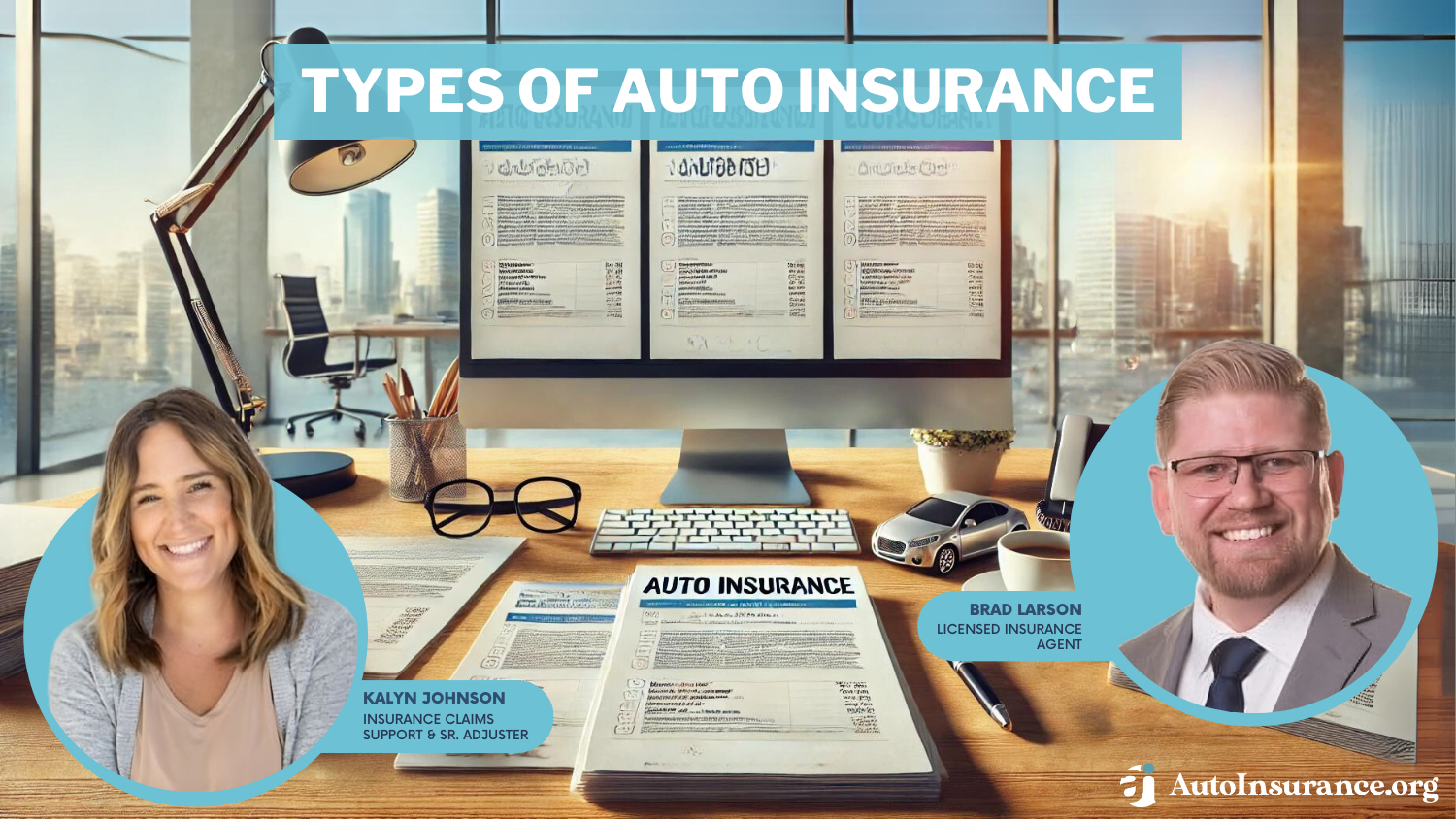
Frequently Asked Questions
What are the three types of car insurance?
The 3 types of car insurance commonly mandated by most states and lenders are liability, collision, and comprehensive. These essential policies represent the most common auto insurance coverage options.
What are the two types of liability auto insurance coverage?
The two different liability auto insurance types are bodily injury and property damage liability auto insurance.
What is a full coverage policy?
Typically, a full-coverage auto insurance policy includes liability, collision, and comprehensive insurance. For comprehensive protection, drivers can also add Personal Injury Protection (PIP) or Medical Payments (MedPay). This combination covers various types of car insurance, ensuring that different types of insurance coverage and types of car insurance are included.
Learn More: Do you need medical payment coverage on auto insurance?
What is the one type of auto insurance everyone must carry?
Liability insurance is among the most cost-effective auto insurance options that every driver is required to have. If a driver is responsible for causing harm to another person or vehicle, this type of insurance covers the damages incurred by the other party. This is a prime example of the different car insurance types available.
Is full coverage the same as comprehensive insurance?
No, they are not the same. Full coverage refers to a policy that includes liability, collision, and comprehensive coverages, representing different car insurance levels. On the other hand, comprehensive insurance is a type of insurance coverage that addresses damages caused by animals, weather, vandalism, and other unexpected incidents. These illustrate examples of the three types of auto insurance. Discover cheap full coverage auto insurance in our guide.
What is collision coverage?
Collision coverage covers the repair costs for your vehicle if you collide with another car or a stationary object, like a mailbox. Drivers who finance or lease their cars are required to have this coverage. Understanding collision coverage is essential when exploring car insurance choices. It’s one of the five types of vehicle insurance coverage illustrated in the automobile insurance examples.
Is it worth it to carry comprehensive coverage on an older car?
The general guideline is that if the yearly expense of comprehensive coverage matches your car’s total value over a few years, it’s advisable to skip comprehensive insurance. Otherwise, you might pay the equivalent of your car’s worth in coverage fees within a few years. This applies to all car insurance cover types, including auto insurance for young adults. Comparing policies from the best comprehensive auto insurance companies can help you decide whether this coverage is worth it for your vehicle.
What is recommended for car insurance coverage?
What is needed for adequate auto insurance coverage? We suggest that most drivers opt for a full coverage insurance policy, which includes essential vehicle insurance coverage types such as liability, comprehensive, and collision auto insurance. For the best rates, check out autoinsurancequotes.com and cheapdev.autoinsurance.org for cheap car insurance options.
What are the basic types of auto insurance?
The basic types of auto insurance include liability, collision, and comprehensive coverages. These foundational coverages protect against the most common risks drivers face.
How many types of car insurance are there?
In the realm of car insurance in the USA, the Missouri Auto Insurance Plan offers a spectrum of coverage options. These include various types of driving insurance such as liability, collision, comprehensive, PIP, uninsured/underinsured motorist, and gap insurance, each distinguished by specific car insurance codes.
What kind of auto insurance do I need?
The kinds of car insurance you need depend on several factors, including your vehicle’s value, how you use your vehicle, your financial situation, and your state’s requirements. Most drivers need at least liability insurance, but many also benefit from collision and comprehensive coverage.
What is the difference between collision and comprehensive auto insurance?
Collision insurance is among the cheapest car insurance in Michigan, providing coverage when you hit another vehicle. On the other hand, comprehensive insurance, which is also part of the most common car insurance coverage, protects against damages from incidents like hitting an animal, weather-related events, or unexpected situations like if a tree falls on your vehicle.
To find the cheapest car insurance quotes, including USAA options, consider looking up their MBI number for detailed information. For a deeper understanding, check out “Collision vs. Comprehensive Auto Insurance Explained” to learn more about how these coverages differ and what they offer.
Which of the following types of automobile insurance coverage is usually required by most states?
Most states usually require Liability Insurance.
How do you choose car insurance?
Wondering how to choose car insurance? Here are five easy steps to help you find the right coverage:
- Assess Your Needs: Determine the level of coverage you need based on your vehicle, driving habits, and financial situation.
- Research State Requirements: Ensure you meet your state’s minimum coverage requirements.
- Shop Around: Compare policies and quotes from different insurers.
- Check for Discounts: Look for discounts for safe driving, multiple policies, good grades (for students), etc.
- Review the Insurer’s Reputation: Consider customer service ratings and financial stability.
Following these steps ensures you’ll find a policy that offers the right balance of coverage, affordability, and reliability.
How much is 15e insurance?
The term “15e insurance” is unclear and could refer to a specific type of insurance or policy. Please provide more details for an accurate answer.
Is buying more than minimum coverage insurance necessary for drivers?
If you don’t have a low-value older car, you should get full coverage auto insurance. Safeco auto insurance coverage levels provide better protection than minimum coverage, which only pays for the other driver’s repair costs after an accident, not yours. For the best type coverage, especially if you drive for services like Instacart, consider comprehensive coverage to ensure all potential expenses are covered.
How do you choose auto insurance coverage?
To choose auto insurance coverage:
- Understand Your State Requirements: Know the minimum coverage required by your state.
- Evaluate Your Personal Needs: Consider factors like the value of your car, your financial situation, and your driving habits.
- Compare Quotes: Get quotes from multiple insurance providers.
- Consider Additional Coverages: Evaluate the need for additional coverages like collision, comprehensive, PIP, or roadside assistance.
- Check for Discounts: Look for available discounts and bundling options.
- Read Reviews: Check the reputation and customer service ratings of insurance companies.
Learn more in our article, “How to Choose an Auto Insurance Policy.”
What is grid level in insurance?
Grid level in insurance typically refers to a standardized rate or pricing mechanism used in some regions to ensure fair and equitable premiums, particularly for high-risk drivers. This can vary by location and specific insurance regulation frameworks.
What is uninsured motorist coverage?
Uninsured motorist coverage protects you if you’re involved in an accident with a driver who doesn’t have liability insurance or if you’re the victim of a hit-and-run. It covers medical expenses, lost wages, and other damages.
What are the types of car insurance coverage?
What are the different types of auto insurance? The types of vehicle insurance coverage are:
- Liability Coverage
- Collision Coverage
- Comprehensive Coverage
- Personal Injury Protection (PIP)
- Underinsured/Uninsured Motorist Coverage
- Medical Payments Coverage (MedPay)
- SR-22 Coverage
- Non-Owner Coverage
- Rideshare Coverage
- Classic Car Coverage
- Emergency Roadside Assistance Coverage
- Gap Insurance
- Mechanical Breakdown Coverage
- Modified Auto Coverage
- New Car Replacement Coverage
- Rental Reimbursement Coverage
- Umbrella Coverage
- Usage-Based Coverage
With so many options, you might wonder how many types of car insurance are there and which ones you need. The right combination of coverage can help protect you and your vehicle based on your driving habits.
How auto insurance works?
So, what is auto insurance, and how does it work? Auto insurance provides financial protection against physical damage and/or bodily injury resulting from traffic collisions and against liability that could also arise from incidents in a vehicle. When you pay premiums to an insurance company, they promise to pay your costs if you suffer a covered loss, such as an accident, theft, or other damage. Depending on your needs, different auto insurance types offer varying levels of protection for different situations.
What are the basic types of auto insurance?
The basic types of auto insurance are:
- Liability Insurance: Covers bodily injury and property damage you cause to others.
- Collision Insurance: Covers damages to your vehicle from collisions with other vehicles or objects.
- Comprehensive Insurance: This covers damages to your vehicle from non-collision events like theft, fire, or natural disasters.
These are some of the different kinds of auto insurance, each covering specific situations to help you get the protection you need. Enter your ZIP code into our free comparison tool to find the best auto insurance quotes near you.
Free Auto Insurance Comparison
Enter your ZIP code below to view companies that have cheap auto insurance rates.
Secured with SHA-256 Encryption
Brad Larson
Licensed Insurance Agent
Brad Larson has been in the insurance industry for over 16 years. He specializes in helping clients navigate the claims process, with a particular emphasis on coverage analysis. He received his bachelor’s degree from the University of Utah in Political Science. He also holds an Associate in Claims (AIC) and Associate in General Insurance (AINS) designations, as well as a Utah Property and Casual...
Editorial Guidelines: We are a free online resource for anyone interested in learning more about auto insurance. Our goal is to be an objective, third-party resource for everything auto insurance related. We update our site regularly, and all content is reviewed by auto insurance experts.

